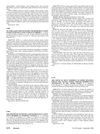 2 citations,
February 2023 in “BMC endocrine disorders”
2 citations,
February 2023 in “BMC endocrine disorders” Curcumin improved some metabolic factors in women with PCOS but did not affect cholesterol, insulin, or testosterone levels.
2 citations,
July 2022 in “Journal of the Endocrine Society” Some women with PCOS have rare genetic variants linked to the condition.
 2 citations,
June 2022 in “Scientific reports”
2 citations,
June 2022 in “Scientific reports” Women with PCOS have higher hair cortisol levels, which are linked to worse metabolic and inflammatory conditions.
 2 citations,
February 2022 in “Frontiers in Endocrinology”
2 citations,
February 2022 in “Frontiers in Endocrinology” Antiandrogenic pretreatment for women with PCOS does not improve fertility outcomes and delays pregnancy.
 2 citations,
September 2021 in “JCPSP. Journal of the College of Physicians & Surgeons Pakistan”
2 citations,
September 2021 in “JCPSP. Journal of the College of Physicians & Surgeons Pakistan” Women with PCOS have thicker parafoveal areas in their retinas, but their macular blood vessel density is normal.
 2 citations,
May 2021 in “Journal of the Endocrine Society”
2 citations,
May 2021 in “Journal of the Endocrine Society” Men with high genetic risk for Polycystic Ovary Syndrome (PCOS) have increased chances of obesity, type 2 diabetes, heart disease, and hair loss, showing PCOS risk factors can affect both genders.
 2 citations,
April 2021 in “Reproductive health of woman”
2 citations,
April 2021 in “Reproductive health of woman” Most women with polycystic ovary syndrome (PCOS) have menstrual issues, infertility, acne, and excessive body hair, with the most common type being the non-androgenic phenotype.
 2 citations,
February 2021 in “International Journal of Environmental Research and Public Health”
2 citations,
February 2021 in “International Journal of Environmental Research and Public Health” Women with PCOS tend to be less optimistic than those without it.
2 citations,
November 2020 in “Journal of Nepal Medical Association” PCOS is often linked with menstrual issues, hormonal imbalances, and a higher risk of heart disease and diabetes.

Women with Polycystic Ovary Syndrome (PCOS) have a lower health-related quality of life, especially those with an anovulatory phenotype, and need specific interventions to improve it.

In 2020, a new online survey was made to help identify Polycystic ovary syndrome (PCOS) in women, but it needs some improvements for better understanding and accuracy.
 2 citations,
April 2019 in “Медицинский совет”
2 citations,
April 2019 in “Медицинский совет” Combined oral contraceptives improve skin, hormone levels, and quality of life in women with PCOS.
 2 citations,
November 2018 in “International journal of gynaecology and obstetrics”
2 citations,
November 2018 in “International journal of gynaecology and obstetrics” Women with different PCOS types have similar fertility treatment results.
 2 citations,
January 2018 in “Biology and medicine”
2 citations,
January 2018 in “Biology and medicine” High testosterone levels in 20% of the women studied may indicate PCOS, while 80% had low levels with potential health impacts.
 2 citations,
January 2018 in “Sovremennye problemy nauki i obrazovaniâ”
2 citations,
January 2018 in “Sovremennye problemy nauki i obrazovaniâ” Hirsutism and acanthosis nigricans are important for diagnosing PCOS; dermatologists play a key role in early detection and treatment.
 2 citations,
June 2017 in “Journal of The American Academy of Dermatology”
2 citations,
June 2017 in “Journal of The American Academy of Dermatology” The type of PCOS a woman has doesn't strongly predict her skin or metabolic symptoms; obesity is a more important factor.
 2 citations,
May 2017 in “International journal of reproduction, contraception, obstetrics and gynecology”
2 citations,
May 2017 in “International journal of reproduction, contraception, obstetrics and gynecology” Myoinositol helps improve menstrual cycles and some skin issues in women with PCOS.
 2 citations,
January 2017
2 citations,
January 2017 PCOS is a common hormonal disorder in women that can lead to various health issues and requires comprehensive management.
2 citations,
January 2017 in “Iraqi journal of medical sciences” Obese women with PCOS have lower zinc levels than non-obese ones.
 2 citations,
January 2017 in “Cambridge University Press eBooks”
2 citations,
January 2017 in “Cambridge University Press eBooks” Manage PCOS in primary care with weight loss, psychological support, medication, and monitoring for health risks.
 2 citations,
September 2014 in “Journal of evolution of medical and dental sciences”
2 citations,
September 2014 in “Journal of evolution of medical and dental sciences” Evaluating various physical and health factors helps diagnose polycystic ovarian syndrome (PCOS).
 2 citations,
January 2014 in “Springer eBooks”
2 citations,
January 2014 in “Springer eBooks” Polycystic Ovary Syndrome (PCOS) often leads to severe acne, and lifestyle changes and hormonal treatments can help manage it.
 2 citations,
July 2012 in “Journal of Pediatric and Adolescent Gynecology”
2 citations,
July 2012 in “Journal of Pediatric and Adolescent Gynecology” A 12-year-old girl with very high testosterone and insulin resistance improved with birth control pills, suggesting PCOS can cause high testosterone without tumors.
 2 citations,
May 2010 in “Journal of Obstetrics and Gynaecology Canada”
2 citations,
May 2010 in “Journal of Obstetrics and Gynaecology Canada” PCOS is a complex condition linked to hormonal imbalance and insulin resistance, with weight loss being important for management.
 2 citations,
September 2009 in “Nurse Prescribing”
2 citations,
September 2009 in “Nurse Prescribing” PCOS affects many women, causing various symptoms and health risks, and is managed through lifestyle changes, medication, and support groups.
 2 citations,
June 2009 in “The Nurse practitioner”
2 citations,
June 2009 in “The Nurse practitioner” Doctors should recognize and treat PCOS early in primary care to manage symptoms and lower risk of other health issues.
 2 citations,
October 2008 in “The Journal for Nurse Practitioners”
2 citations,
October 2008 in “The Journal for Nurse Practitioners” The document concludes that managing PCOS requires a comprehensive approach, including lifestyle changes and medication, to improve symptoms and reduce health risks.
 2 citations,
September 2008 in “Fertility and Sterility”
2 citations,
September 2008 in “Fertility and Sterility” Women with PCOS and higher BMI, especially those with morbid obesity, are at greater risk for depression.
 2 citations,
May 2006 in “Women's Health Medicine”
2 citations,
May 2006 in “Women's Health Medicine” PCOS is diagnosed when at least two of these three features are present: polycystic ovaries, irregular ovulation, and high androgen levels.
 2 citations,
December 1994 in “The Journal of clinical endocrinology and metabolism/Journal of clinical endocrinology & metabolism”
2 citations,
December 1994 in “The Journal of clinical endocrinology and metabolism/Journal of clinical endocrinology & metabolism” The treatment effectively reduced hair growth and was safe for patients with PCOS, but it needs better bleeding control.


























